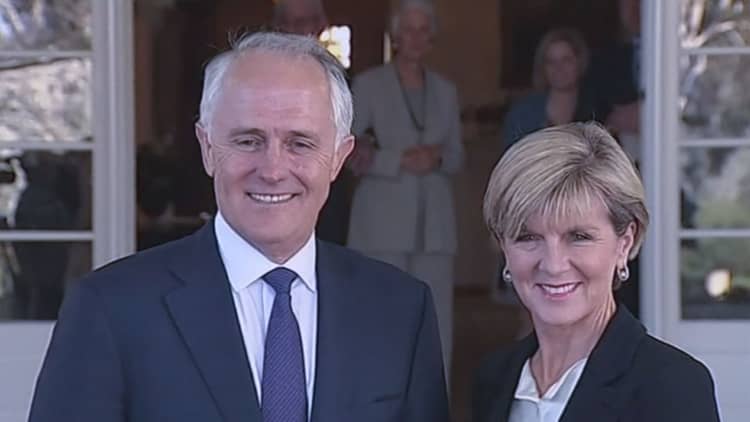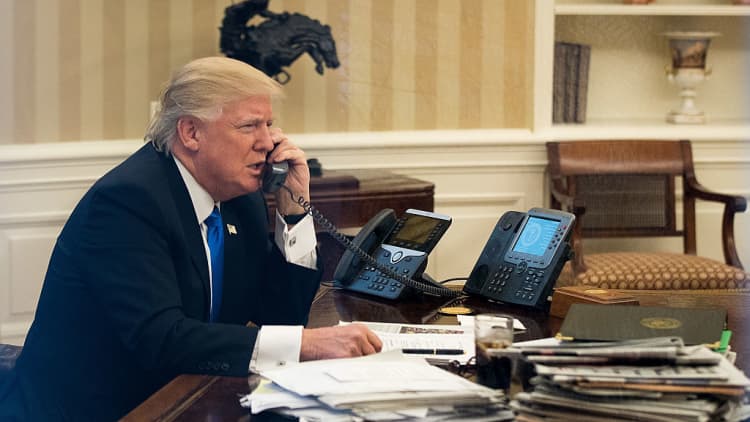
An apparent disagreement between President Donald Trump and Australian Prime Minister Malcolm Turnbull could potentially disrupt more than 75 years of robust diplomatic relations.
Trump's displeasure with an Obama-backed deal is leading security and trade experts to question whether the U.S. could lose its standing with one of its most important strategic partners. Such a shift, they said, could ripple through Australian politics and support China's ambitions to become the dominant Asia Pacific power.
The U.S. is arguing with Australia?
In a late-night Wednesday tweet, Trump slammed an Australian-U.S. refugee agreement that was brokered by Barack Obama's administration last year, saying he would commit to study the "dumb deal."
In November, Obama agreed that the U.S. would resettle 1,250 refugees held at offshore prisons on the island nations of Nauru and Papua New Guinea. Migrants attempting to enter Australia are often stopped and sent to those detention centers, so Canberra has been involved in negotiating their future.
But the fate of that U.S. arrangement is now being publicly questioned in the wake of Trump's Twitter outburst, which followed a report that the president had berated Turnbull about the deal during a Jan. 28 discussion, and eventually "abruptly ended" the phone call. Following that interaction, White House spokesperson Sean Spicer had said Trump would honor the refugee deal, but the Wednesday tweet confused the arrangement.
To further muddy the issue, Turnbull told local media on Thursday that Trump had assured him that the deal would go ahead as planned.
A White House official told NBC News that chief of staff Reince Priebus and chief strategist Stephen Bannon had a "productive" meeting with the Australian ambassador in Washington on Thursday. In that meeting, the two top advisors "conveyed the president's deep admiration for the Australian people," the official said.
Regardless of the differing accounts, experts expressed surprise at the level of public disagreement between the two close allies, and concerns over the potential fallout.
The alliance
Australia and the U.S. share a major trade relationship—one worth $35.3 billion in 2013—as well as robust ties in a number of areas, including defense, health and technology.
Trump's tweet on Wednesday represents an "erosion of trust," which is damaging for the close alliance between Washington and Canberra, said Rory Medcalf, head of the National Security College at the Australian National University.
"This will surely undermine the trust the Australian government has in the confidentiality and mutual respect that is normally a part of high-level conversations with the U.S. leadership," he said.

Enter Beijing
While nobody expects any immediate deterioration in U.S.-Australian ties, the notion of Trump backtracking on the deal could push the world's 12th-largest economy to an even closer relationship with Beijing.
"Trump is unintentionally helping China in its efforts to weaken the alliance system that supports Asia's security and stability," Medcalf said.
In a trend that's becoming a major theme of his presidency, Trump's heated rhetoric is hurting ties with traditional U.S. allies, such as Mexico and now Australia. That could benefit China, who's looking to increase trade flows and extend its sphere of global influence.
China is already Australia's largest trading partner—the two nations finally inked a free trade agreement in December 2015—and is a key destination for commodity exports from Down Under.
Australia in a tough spot
This public spat is particularly challenging for the Australian government, as domestic sensitivities about refugees are running high.
Canberra is very conscious of the fact that the Obama-negotiated deal clashes with Trump's own immigration policy agenda, said Lauren O'Neil, Asia Pacific senior consultant at Control Risks, but the arrangement is nevertheless non-negotiable for Australia.
"It's a sensitive issue for the government, so talk of resettling [somewhere other than the U.S.] won't sit well with Canberra. The government simply has no political wiggle-room around this," O'Neil said.
Human rights groups have long publicized the numerous violations relating to the treatment of refugees in the island nations' prisons, with Human Rights Watch calling Australia a partner in "refugee abuse" last October.
"Mr. Turnbull needs to stop trying to appease Trump and should stop trying to do some special deal with America to hide Australia's own embarrassment about not supporting the rights of refugees," warned Andrew Scott, politics and policy professor, at Melbourne-based Deakin University.
A shake up Down Under?
At home, Turnbull is a deeply unpopular leader and his response to the current spat could determine his political future.
"He can't really afford to take a wrong step right now as opposition parties are watching him with a hawk's eye, so there is potential for this situation to be politicized in Australia, especially if the deal falls through," warned Control Risks' O'Neill.
Nearly half—46 percent—of Australian voters disapprove of their prime minister, according to a November poll conducted by Essential Research.
"Turnbull's situation is so precarious, so any chance to diminish his public standing is leapt upon," O'Neill continued.
Follow CNBC International on Twitter and Facebook.

